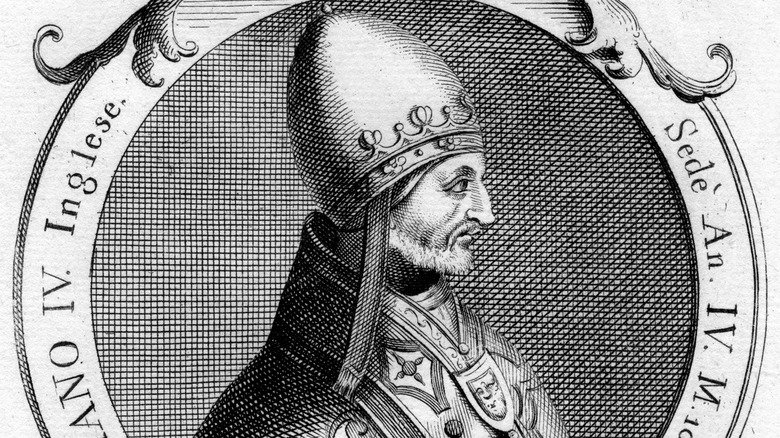Did A Pope Really Choke To Death On A Fly? Here's What We Know
It'd be quite the horrifying, foreboding scene. You, your bishop buddies, some attendants, and other pontifical persons sit at the table having dinner like any other evening. There's some wine going around, maybe some jokes, maybe some talk about God or politics, and snap — the pope starts choking. People ask him if he's okay, but he can't respond. He drops his food, maybe his goblet, clutches his throat, but no one knows what to do. Folks race to his side, call for help, and maybe check his mouth for anything stuck in the throat, but ... It's too late. The pope has died right there and then. And now, someone is swearing that they spotted a fly zip into his mouth just before he choked.
Whether or not anyone took this very inauspicious happening as a warning from the Almighty is unknown. But witnesses said it did happen. The Catholic Church Bishop's Conference of England and Wales says that in 1159 C.E., people witnessed Pope Adrian IV die in this exact manner. Born Nicholas Breakspear around 1,000 C.E., he was the only Englishman in history to assume the title of pope, nearly 400 years before King Henry VIII broke from Catholicism in 1534. Sources like Historic U.K. say that a fly was indeed involved, but was already dead in the wine. Ultimately, though, while no one can go back in time to do an autopsy, sources generally agree that the likely culprit was tonsilitis. Specifically, as Hertfordshire Mercury says, a tonsillitis-related complication called quinsy.
From humble beginnings
As difficult as it is to imagine that a pope could die from a happening as bizarre as choking on a fly, it's nearly as difficult to imagine a pope being English. Before becoming Pope Adrian IV, Nicholas Breakspear was raised in a clerical family. Nicholas' father Robert was a monk at St. Albans Abbey northwest of London. Described as "a man of humble means, though of a decent stock," Robert assumed his son would join his monastery with him (per the Catholic Church Bishop's Conference of England and Wales). Nicholas, however, was refused entry because he wasn't well-educated enough and relegated to performing menial jobs around the monastery grounds. Speaking to BBC's The One Show (via Hertfordshire Mercury), Reverend Dr. Anders Bergquist said Robert eventually got so embarrassed by the situation that he ordered Nicholas to stay away.
It's this very path, however, that led Nicholas to become Pope Adrian IV. Historic U.K. says that Nicholas went to France, got educated there, and joined St. Rufus Monastery near Avignon. Nicholas became a favorite of the monastery and through a combination of charisma and reported good looks got elected abbot. He wound up catching the attention of Pope Eugene III, who made him Cardinal Bishop of Albano in 1149 C.E. After that Nicholas worked on church and education reforms in Scandinavia before being elected pope — unanimously, we might add — in 1154 C.E. But he was only pope for five years before he met his strange and untimely death.
Death by wine, fly, or infected tonsils
While it seems much more likely that Pope Adrian IV died from a tonsilitis-related complication rather than from choking on a fly, we really don't know. Maybe he choked on a fly, maybe he just choked on wine. We don't even know if a fly was present at all.
We do know, however, that his suspected cause of death — quinsy, an infection related to the tonsils — is not to be taken lightly. A quinsy is an abscess — an accumulation of pus often caused by an infection. It forms in the tissue near the tonsils, or in the area if someone has just had their tonsils removed. It can also be caused by dental infections or diseases like tuberculosis that create throat lesions. It's also one of the most common infections for people to experience in the head and neck in general, and even with benefit of modern medicine recurs in 9% to 22% of patients, per Infectious Diseases in Pediatric Otolaryngology. In other words: Much more likely than a fly.
Folks who have quinsy often have fevers, throat pain, difficulty speaking, etc. And to make matters worse, it can spread down into the lungs and chest, as well. While there's no historical record of Pope Adrian IV suffering from such symptoms leading up to his death, we wouldn't be surprised if he was. For a person who rose from humble beginnings to become pope it's a sad fate, indeed.


